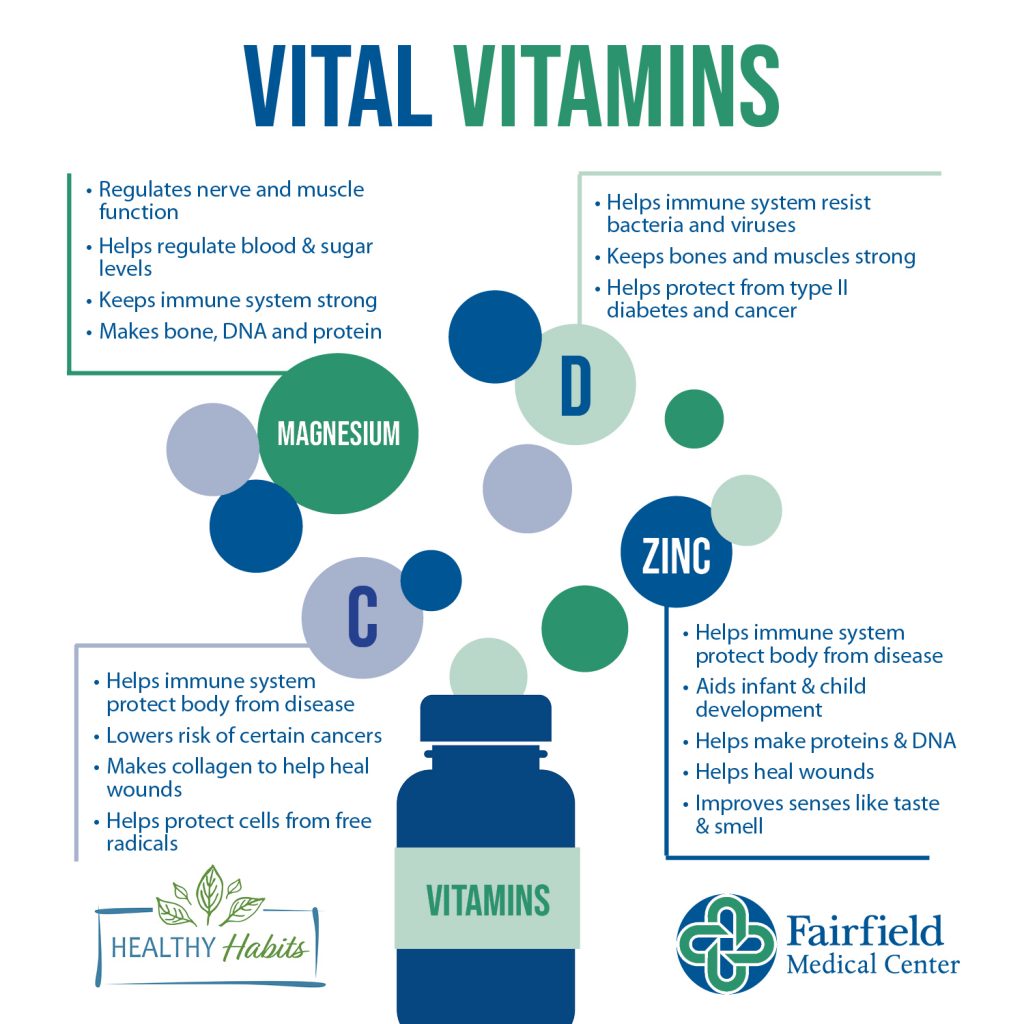
 Article originally published on February 2, 2021.
Article originally published on February 2, 2021.
You may have grown up hearing people say, “Don’t forget to take your vitamins.” So you probably already know that vitamins have many different benefits at every stage of our lives. Now more than ever, COVID-19 has put a spotlight on all the variety of ways we can protect ourselves from sickness, including the best ways to boost our immune system. Here are a few things to know about certain vitamins, many of which are found in the food we eat every day, and the role these play in protecting our body and living well:
Vitamin C –Vitamin C has many benefits. It helps the immune system function properly to protect our bodies from disease and can lower the risk of lung, breast and colon cancer, as well as cardiovascular disease and cataracts. It makes collagen, which helps heal wounds, and improves iron absorption of certain plant-based foods we eat. Vitamin C acts as an antioxidant that helps protect cells from damage caused by free radicals, which are compounds found during the development of oxygen.
Vitamin C is best found in fruits and vegetables, such as citrus fruits and their juices, red and green peppers, kiwifruit, broccoli, strawberries, cantaloupe, baked potatoes and tomatoes. Eating a wide variety of fruit and vegetables will help you get the recommended amount of Vitamin C. Remember that Vitamin C content can be reduced if foods are cooked, so it is best to eat these fruits and vegetables raw to absorb the full benefit.
Vitamin D – Vitamin D helps the immune system resist bacteria and viruses. It also helps the body absorb calcium, which builds strong bones and may keep muscles strong. Vitamin D can protect you from diseases such as type 2 diabetes and cancer. Our bodies can make Vitamin D from the sun’s rays, but level of sunlight exposure, skin color, geography or other factors can cause a deficiency.
Often added to milk, Vitamin D is naturally found in mushrooms, egg yolks, liver and fatty fishes.
Zinc – This nutrient is found in cells throughout the body and helps the immune system fight off invading viruses and bacteria, helping us stay healthy. Zinc is especially important during pregnancy, infancy and childhood to support proper development. The body needs zinc to make proteins and DNA, help wounds heal and develop senses such as taste and smell.
Foods such as oysters, red meat, poultry, crab and lobsters, beans, nuts, whole grains and dairy products provide zinc.
Magnesium – Magnesium ensures our bodies can perform many different tasks by helping muscles contract and nerves to send and receive messages. Our bodies need magnesium to help regulate nerve and muscle function, as well as blood pressure and blood sugar levels. It also helps keep our immune system stay strong, and makes bone, DNA and protein.
Magnesium can be found in legumes, nuts, seeds, green leafy vegetables, whole grains, milk, yogurt and other milk products
Should I take a vitamin supplement?
All of these vitamins are commonly found in some of our favorite foods and are also available as over-the-counter supplements. Before taking any additional vitamins or supplements, always discuss a vitamin regimen with your primary care provider to avoid affecting any current prescriptions you are taking. Your provider will help you determine your recommended daily dosage based on your age, weight and gender. Learn more about Fairfield Healthcare Professionals Primary Care services.